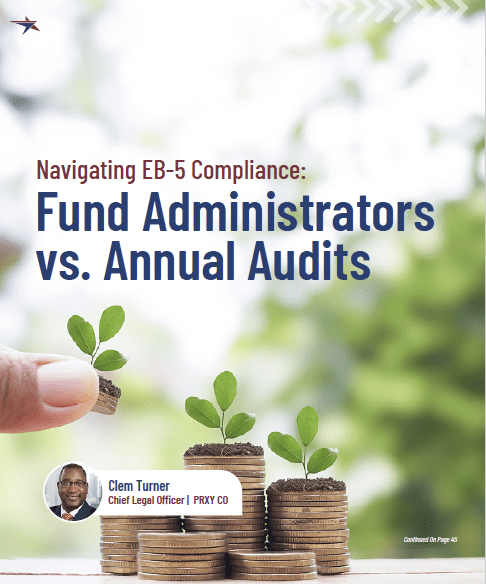RCBJ Perspectives: Navigating EB-5 Compliance – Fund Administrators vs. Annual Audits
By: Clem Turner | Chief Legal Officer, PRXY CO
This article originally appeared in the November 2024 edition of IIUSA’s Regional Center Business Journal.
The Reform and Integrity Act of 2022 (RIA) promulgated several new requirements for the operators of regional centers and new commercial enterprises (NCEs or EB-5 Funds) who raise money under the EB-5 Program. One key reform in Section Q of the RIA bolsters transparency and EB-5 compliance by establishing EB-5 Fund Administrators. EB-5 Funds are required to either retain (i) an EB-5 Fund Administrator or (ii) an accountant to audit their annual books.
This article will examine the pros and cons of these options and offer insights to EB-5 Fund managers as they choose between them. Since compliance is critical in this industry, the choice between an annual audit and a fund administrator can greatly affect both regional centers and investors.
Proactive Compliance v. Retroactive review
Section Q tasks fund administrators with confirming that every disbursement flowing out of the EB-5 Fund is compliant with the fund’s offering documents (e.g., Private Placement Memorandum, Business Plan, Economic Analysis) and governing documents (e.g., LLC Operating Agreement or Limited Partnership Agreement). Fund administrators must also be a co-signatory on the EB-5 Fund’s escrow and/or operating bank accounts and digitally approve all disbursements before funds are released.
The United States Citizenship Immigration Service (USCIS) reviews and approves an EB-5 Fund’s offering and governing documents in connection with its I-965F application. If an EB-5 Fund adheres to its USCIS approved plan for job creation, compliance issues should be minimal when investors seek to remove conditions from their conditional green cards, via the I-829 filing. Thus, a fund administrator provides “statutory guardrails” that help an EB-5 Fund remain compliant.
However, unexpected challenges can arise once development on the job-creating enterprise (JCE or Project) begins. Developers may need to make adjustments, which can lead to compliance risks if the changes materially deviate from the USCIS-approved plan. In these cases, a capable fund administrator can identify potential issues before problematic expenditures are made and collaborate with the project developers, fund managers, and attorneys to find a compliant solution.
On the other hand, auditors review a year’s worth of expenses to confirm that funds were spent in line with the EB-5 Fund’s financial records. While auditors are well-versed in Generally Accepted Accounting Principles (GAAP), they may lack the immigration expertise needed to determine if an expenditure meets the job creation requirements of the EB-5 program and/or is consistent with the documents in the I-956G. For instance, if the NCE and JCE are affiliated, an auditor may not know that a construction consultant’s verification is required for all EB-5 Fund expenditures. Typically, auditors are not conducting a review that considers the underlying immigration compliance of a Fund’s expenditures.
Even if an accounting firm is familiar with the immigration issues surrounding an EB5 Fund audit, if they discover a problem, they will be raising issues after the money has been spent and fixing the issue could be difficult.
CONTINUE READING










